China and Covid19
Got Covid? Don’t Panic, Stay Home: China Is Shifting Its Covid Narrative
China changes its Covid approach, and Weibo users are still getting used to the idea: “We are going from one extreme to the other.”
Published
2 years agoon
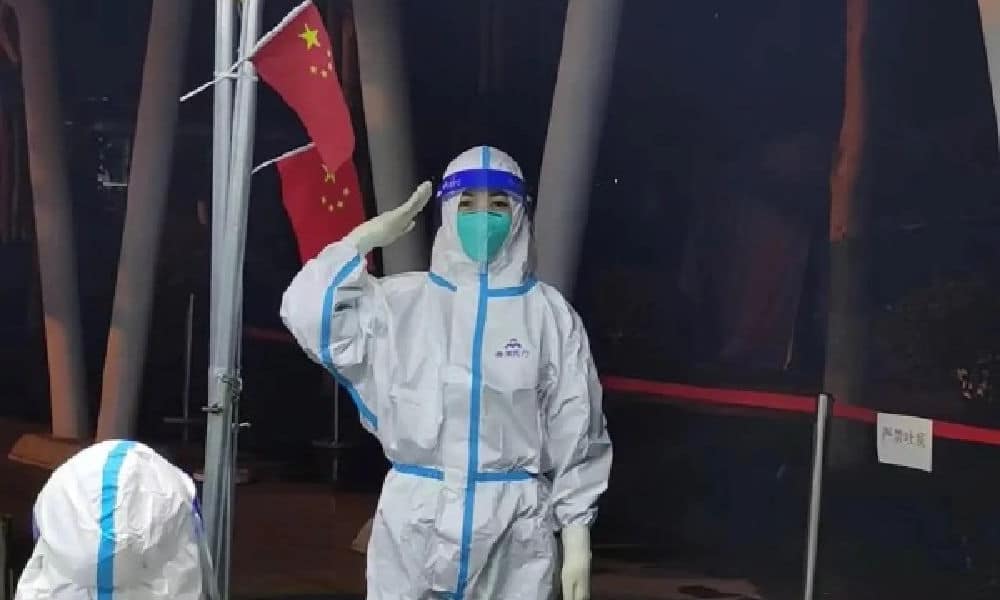
China’s media narratives around testing positive for Covid have dramatically shifted recently. The seemingly sudden change in Covid approach is making some people happy, but many on Weibo also say it is making them nervous.
“What To Do If You Tested Positive [for Covid]?” (#如果阳了怎么办#) was a top trending topic on Weibo on Tuesday, December 6, when the site was still in grey mode over Jiang Zemin’s death.
The topic, initiated by Chinese state media outlet China News Service (中国新闻网), received over 400 million clicks on Tuesday.
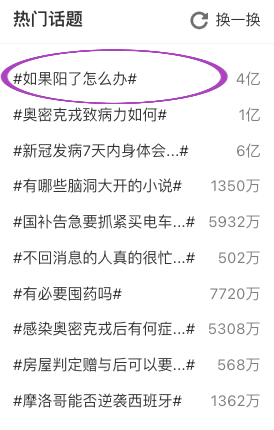
The “What To Do If Testing Positive” hashtag was noteworthy for a couple of reasons. Firstly, the fact that it was initiated by state media and included in the top trending lists of the day is part of the recent normalization of getting Covid in Chinese official media.
Another reason why it was noteworthy, is because the original China News Service post that topped the hashtag page compared Covid to seasonal influenza, writing:
“The autumn and winter season is the peak season for the flu. Currently, the epidemic situation is still popping up all over the country, and there is a risk in catching Omicron for special populations such as young children, pregnant women.”
The article that China News Service linked to provides more information intended for Covid-positive children and the protection of pregnant women, provided by the expert physician Qiao Jie (乔杰) of the Peking University Third Hospital and Dr. Wang Quan (王荃) of Beijing Children’s Hospital. In the article, the symptoms of the Omicron strain are also compared to those of the flu, saying that they need to be treated in line with other respiratory illnesses.
The article basically advised the following:
– Parents should seek medical attention for children with a continued high fever and persistent cough.
– Children under three months old with a fever should always be brought in to be seen by a doctor.
– Always seek medical attention for children who are lethargic, have severe pain (including abdominal pain), continue vomiting or have frequent diarrhea, are dehydrated (not urinating for prolonged periods), or have trouble breathing.
– Pregnant women without underlying conditions who get Omicron do not necessarily get sicker than regular patients and can also expect to recover within seven days.
– Pregnant women who get infected with Omicron should contact their midwife.
– Couples of childbearing age are advised to get vaccinated against Covid-19 before seeking pregnancy.
One day after this trending hashtag, news came out that Chinese central authorities will further adjust and optimize the country’s Covid response based on a top-level meeting that took place on December 6 (#中央政治局会议要求优化疫情防控措施#). (Read about the ten new rules in our article here.)
One of the biggest changes in the Covid approach is that people who have tested positive but show mild signs or are asymptomatic will no longer be required to go to a centralized quarantine location. Instead, they can recover at home if they meet certain requirements.
Another major change is that nucleic acid test results and health codes will no longer be checked for domestic cross-regional travel. On Wednesday, the hashtag “Health Code” (#健康码#) became top trending on Weibo, receiving over 390 million views by late afternoon.
This major change in policy, which is basically an end to the ‘zero Covid’ policy as we knew it, was preceded not only by the “What To Do If Testing Positive” hashtag, but also by other media reports on people sharing their Covid experience and the well-known political commentator Hu Xijin writing a Weibo post about him preparing to get Covid soon.
China News Service also published an info sheet on Weibo on December 7 informing people on what to do when they test positive and what they can expect.
The state media outlet reassures people that for most, their symptoms will be gone on day seven. If people are staying at home with Covid and see no change and continue to have a high fever after three days, or if they are having difficulties breathing, they are advised to seek medical care.
Otherwise, people are advised to rest and drink plenty of water.
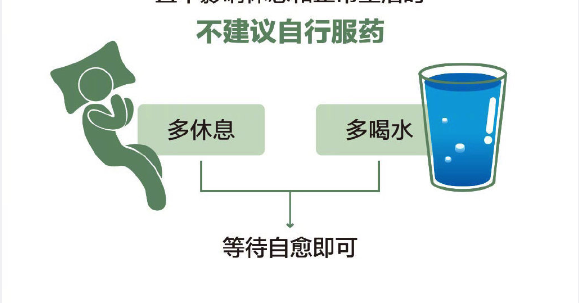
Beijing News Service (北京新闻广播) wrote: “Tested positive? Don’t panic. If you have no symptoms or light symptoms, just stay at home.”
One popular Weibo blogger (@咖啡布偶猫) wrote:
“I feel as if the propaganda has seen a sudden change in direction. During the first half of the year and the epidemic in Shanghai, everyone would get scared the moment you talked about a positive case, they wanted to fiercely chase it and thoroughly reach zero cases. Now they are propagating that we should not panic, that we should accept the reality and actively respond to it, as if it is nothing alarming.”
A Successful Zero Covid Journey
On December 5, Chinese media outlet The Observer (观察者网) initiated the Weibo hashtag “Three Years Since the Fight Against the Epidemic – We’ve Actually Cleared Covid Many Times” (#抗疫3年其实我们清零了很多次#).
The post featured a video (embedded in tweet below) showing China’s fight against Covid by highlighting regions and numbers. Nearly 32,000 cases across the country in early December of 2022 (at time of writing, there are currently over 42,000 confirmed cases); but for a long time during the Covid pandemic, China officially recorded just a few dozen, up to ten, or even zero cases.
A clear shift in Chinese media narratives regarding Covid now & Zero Covid then. The message: China actually already succeeded in reaching ‘zero Covid’ many times (抗疫3年其实我们清零了跟很多次). pic.twitter.com/xbJ1zAgz7t
— Manya Koetse (@manyapan) December 7, 2022
One of the top comments on the post said: “Up to the present, I think that regarding an outbreak of an epidemic virus that caused havoc without us even knowing, driving it out of the country within just a few months, and even sustaining it for some time, is worthy of going into the history books.”
Others write: “One fight against the epidemic has concluded, and another one has begun. Letting go, without zero Covid, it has a happy side and a sad side.”
“Although there were plenty of imperfections in this Covid journey, I still feel the country gave us enough protection when the virus was causing havoc in the early stages.”
“It’s really too strange and it’s a bit spooky everywhere,” another person wrote:
“It’s like a computer that has been hit by a Trojan horse virus and has decided to download antivirus software and is 90% of the way there. Now it’s suddenly stopping; not only deliberately shutting down all the firewalls, but there’s also a mess of pop-up windows everywhere promoting games that are “very fun, come on and play!””
Another Weibo user writes: “We seem to have witnessed an era in which our joint memories have been taken from us for three years.”
“It’s over! We’re on our own from now on!” others write.
Wait and See Approach
Although there is relief among those people who have since long supported an ‘opening up’ of China, there are also many other sentiments that are visible on Chinese social media, most noticeable there is a “let’s wait and see” approach.
Some are waiting to see what will actually change to their situation locally, and others are waiting to see what an easing of Covid measures might mean for China’s healthcare system.
Others express that the new situation makes them feel vulnerable and unsafe.
“Can’t all the people who did not want to open up go and live in one community together?” someone jokingly wrote.

Poster shared on social media: “The Fight Against the Epidemic – The End – It Started in Wuhan, it Ended in Guangzhou”
There are also people who wonder about what will really change for them in the time to come.
“Today is a day that is worth remembering in history. The epidemic situation has lasted for three years, and looking back, there have been many times of complete confusion and total transformation. In these three years time, people’s lifestyles have seen drastic changes and we’ve come to understand more about ‘online’ life: online meetings, online groceries, online parties, online studying, and online travel. We’ve gradually become to dislike crowds, and we’ve become used to locked-down life.”
For some, being Covid positive is an entirely new experience: “Surely enough, we opened up. Even myself – I don’t even go out – tested positive now.”

Meanwhile, people have been stocking up on various medicine and are getting ready to catch Covid anytime soon.
Viral joke about everyone showing off the medication they were able to stock up on. Someone collected all the recommended medicine and asked what else he's missing…Friend replied: getting infected. pic.twitter.com/QpaDL2nUVw
— Manya Koetse (@manyapan) December 8, 2022
One Weibo user writes: “Actually, it makes me anxious to open up everything so suddenly, why can’t we do it step by step?”
“I’m not sure if I am happy or nervous,” another person writes: “We’re going from one extreme to the other extreme.”
By Manya Koetse , with contributions by Miranda Barnes
Get the story behind the hashtag. Subscribe to What’s on Weibo here to receive our newsletter and get access to our latest articles:
Spotted a mistake or want to add something? Please let us know in comments below or email us. First-time commenters, please be patient – we will have to manually approve your comment before it appears.
©2022 Whatsonweibo. All rights reserved. Do not reproduce our content without permission – you can contact us at info@whatsonweibo.com.
Manya Koetse is the founder and editor-in-chief of whatsonweibo.com. She is a writer, public speaker, and researcher (Sinologist, MPhil) on social trends, digital developments, and new media in an ever-changing China, with a focus on Chinese society, pop culture, and gender issues. She shares her love for hotpot on hotpotambassador.com. Contact at manya@whatsonweibo.com, or follow on Twitter.

Also Read
China and Covid19
Sick Kids, Worried Parents, Overcrowded Hospitals: China’s Peak Flu Season on the Way
“Besides Mycoplasma infections, cases include influenza, Covid-19, Norovirus, and Adenovirus. Heading straight to the hospital could mean entering a cesspool of viruses.”
Published
8 months agoon
November 22, 2023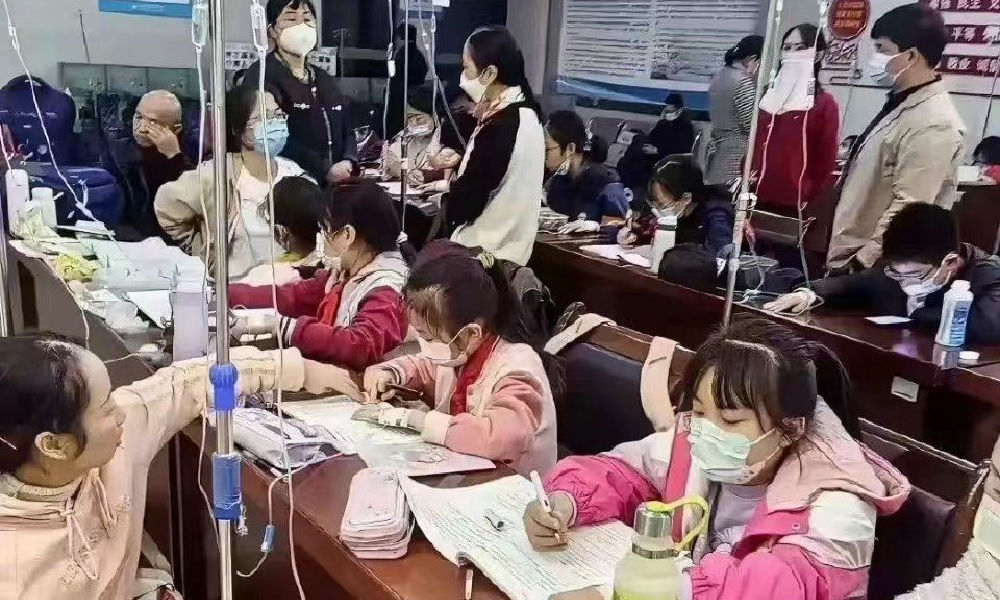
In the early morning of November 21, parents are already queuing up at Xi’an Children’s Hospital with their sons and daughters. It’s not even the line for a doctor’s appointment, but rather for the removal of IV needles.
The scene was captured in a recent video, only one among many videos and images that have been making their rounds on Chinese social media these days (#凌晨的儿童医院拔针也要排队#).
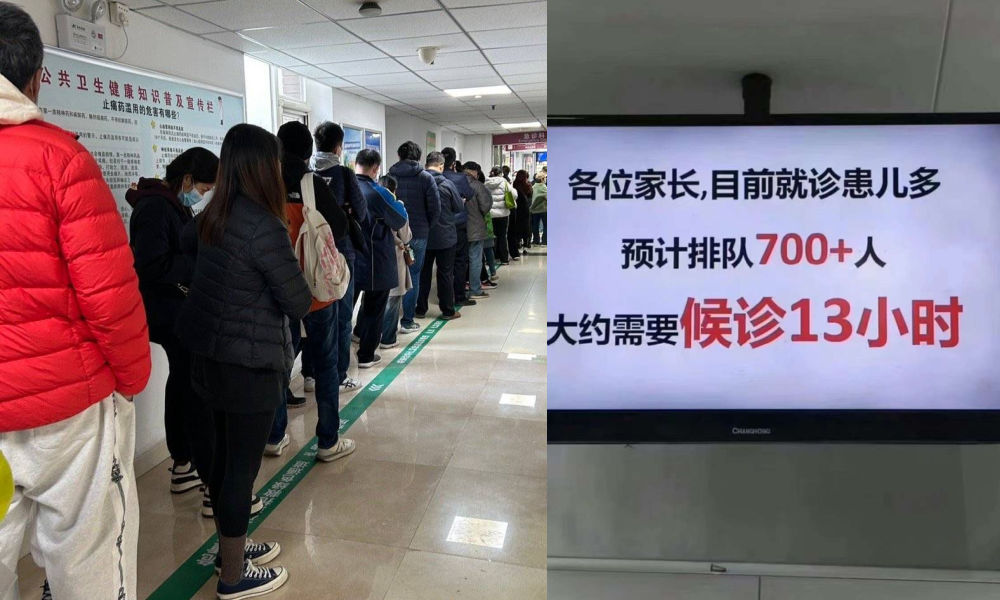
One photo shows a bulletin board at a local hospital warning parents that over 700 patients are waiting in line, estimating a waiting time of more than 13 hours to see a doctor.
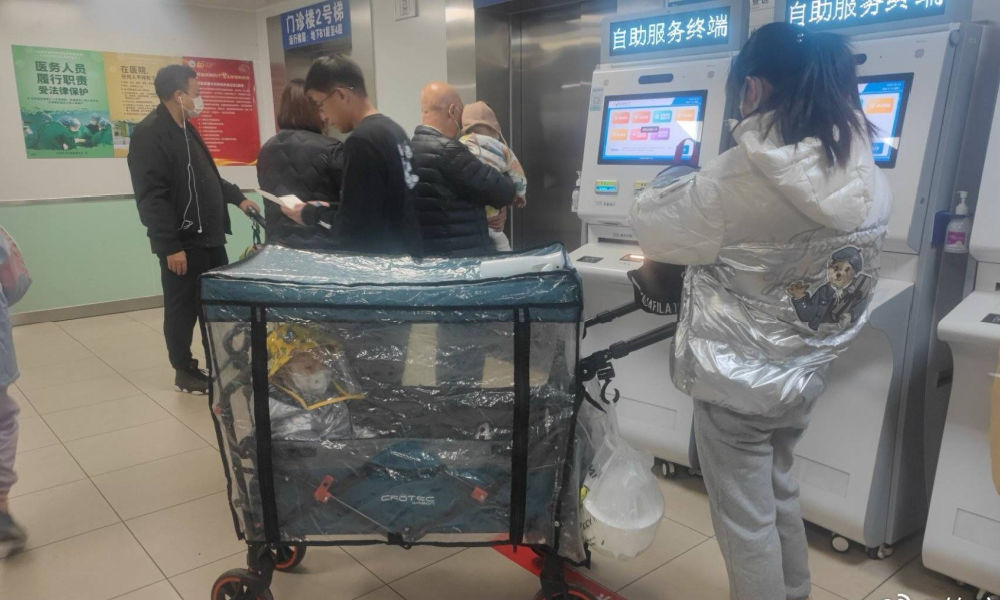
Another image shows children doing their homework while hooked up on an IV.

Recent discussions on Chinese social media platforms have highlighted a notable surge in flu cases. The ongoing flu season is particularly impacting children, with multiple viruses concurrently circulating and contributing to a high incidence of respiratory infections.
Among the prevalent respiratory infections affecting children are Mycoplasma pneumoniae infections, influenza, and Adenovirus infection.
The spike in flu cases has resulted in overcrowded children’s hospitals in Beijing and other Chinese cities. Parents sometimes have to wait in line for hours to get an appointment or pick up medication.
According to one reporter at Haibao News (海报新闻), there were so many patients at the Children’s Hospital of Capital Institute of Pediatrics (首都儿科研究所) on November 21st that the outpatient desk stopped accepting new patients by the afternoon. Meanwhile, 628 people were waiting in line to see a doctor at the emergency department.
Reflecting on the past few years, the current flu season marks China’s first ‘normal’ flu peak season since the outbreak of Covid-19 in late 2019 / early 2020 and the end of its stringent zero-Covid policies in December 2022. Compared to many other countries, wearing masks was also commonplace for much longer following the relaxation of Covid policies.
Hu Xijin, the well-known political commentator, noted on Weibo that this year’s flu season seems to be far worse than that of the years before. He also shared that his own granddaughter was suffering from a 40 degrees fever.
“We’re all running a fever in our home. But I didn’t dare to go to the hospital today, although I want my child to go to the hospital tomorrow. I heard waiting times are up to five hours now,” one Weibo user wrote.
“Half of the kids in my child’s class are sick now. The hospital is overflowing with people,” another person commented.
One mother described how her 7-year-old child had been running a fever for eight days already. Seeking medical attention on the first day, the initial diagnosis was a cold. As the fever persisted, daily visits to the hospital ensued, involving multiple hours for IV fluid administration.
While this account stems from a single Weibo post within a fever-advice community, it highlights a broader trend: many parents swiftly resort to hospital visits at the first signs of flu or fever. Several factors contribute to this, including a lack of General Practitioners in China, making hospitals the primary choice for medical consultations also in non-urgent cases.
There is also a strong belief in the efficacy of IV infusion therapy, whether fluid-based or containing medication, as the quickest path to recovery. Multiple factors contribute to the widespread and sometimes irrational use of IV infusions in China. Some clinics are profit-driven and see IV infusions as a way to make more money. Widespread expectations among Chinese patients that IV infusions will make them feel better also play a role, along with some physicians’ lacking knowledge of IV therapy or their uncertainty to distinguish bacterial from viral infections (read more here)
To prevent an overwhelming influx of patients to hospitals, Chinese state media, citing specialists, advise parents to seek medical attention at the hospital only for sick infants under three months old displaying clear signs of fever (with or without cough). For older children, it is recommended to consult a doctor if a high fever persists for 3 to 5 days or if there is a deterioration in respiratory symptoms. Children dealing with fever and (mild) respiratory symptoms can otherwise recover at home.
One Weibo blogger (@奶霸知道) warned parents that taking their child straight to the hospital on the first day of them getting sick could actually be a bad idea. They write:
“(..) pediatric departments are already packed with patients, and it’s not just Mycoplasma infections anymore. Cases include influenza, Covid-19, Norovirus, and Adenovirus. And then, of course, those with bad luck are cross-infected with multiple viruses at the same time, leading to endless cycles. Therefore, if your child experiences mild coughing or a slight fever, consider observing at home first. Heading straight to the hospital could mean entering a cesspool of viruses.”
The hashtag for “fever” saw over 350 million clicks on Weibo within one day on November 22.
Meanwhile, there are also other ongoing discussions on Weibo surrounding the current flu season. One topic revolves around whether children should continue doing their homework while receiving IV fluids in the hospital. Some hospitals have designated special desks and study areas for children.
Although some commenters commend the hospitals for being so considerate, others also remind the parents not to pressure their kids too much and to let them rest when they are not feeling well.
Opinions vary: although some on Chinese social media say it's very thoughtful for hospitals to set up areas where kids can study and read, others blame parents for pressuring their kids to do homework at the hospital instead of resting when not feeling well. pic.twitter.com/gnQD9tFW2c
— Manya Koetse (@manyapan) November 22, 2023
By Manya Koetse, with contributions from Miranda Barnes
Get the story behind the hashtag. Subscribe to What’s on Weibo here to receive our newsletter and get access to our latest articles:
Spotted a mistake or want to add something? Please let us know in comments below or email us. First-time commenters, please be patient – we will have to manually approve your comment before it appears.
©2023 Whatsonweibo. All rights reserved. Do not reproduce our content without permission – you can contact us at info@whatsonweibo.com.
China and Covid19
Repurposing China’s Abandoned Nucleic Acid Booths: 10 Innovative Transformations
Abandoned nucleic acid booths are getting a second life through these new initiatives.
Published
1 year agoon
May 19, 2023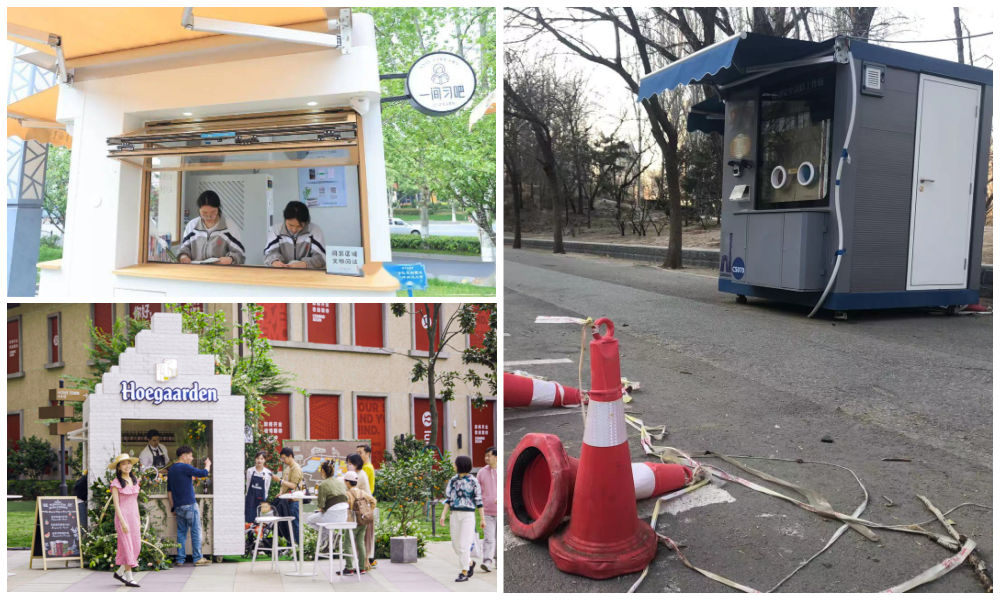
During the pandemic, nucleic acid testing booths in Chinese cities were primarily focused on maintaining physical distance. Now, empty booths are being repurposed to bring people together, serving as new spaces to serve the community and promote social engagement.
Just months ago, nucleic acid testing booths were the most lively spots of some Chinese cities. During the 2022 Shanghai summer, for example, there were massive queues in front of the city’s nucleic acid booths, as people needed a negative PCR test no older than 72 hours for accessing public transport, going to work, or visiting markets and malls.
The word ‘hésuān tíng‘ (核酸亭), nucleic acid booth (also:核酸采样小屋), became a part of China’s pandemic lexicon, just like hésuān dìtú (核酸地图), the nucleic acid test map lauched in May 2022 that would show where you can get a nucleic test.
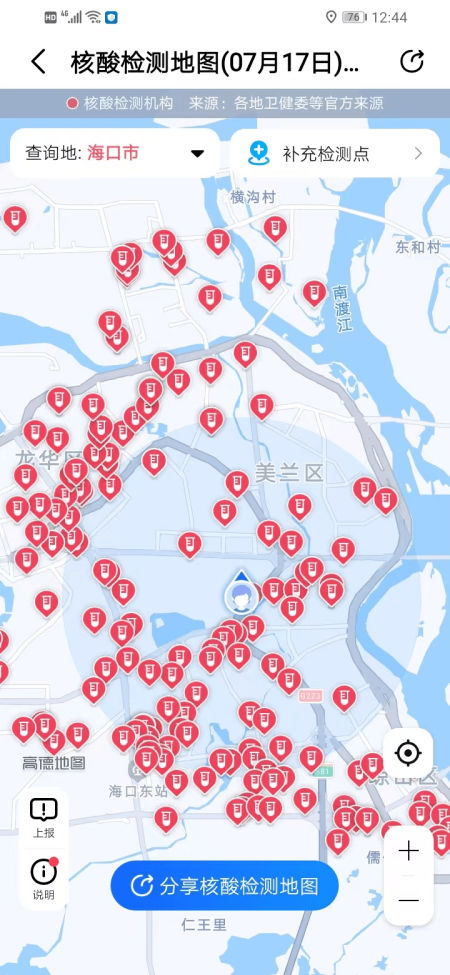
Example of nucleic acid test map.
During Halloween parties in Shanghai in 2022, some people even came dressed up as nucleic test booths – although local authorities could not appreciate the creative costume.
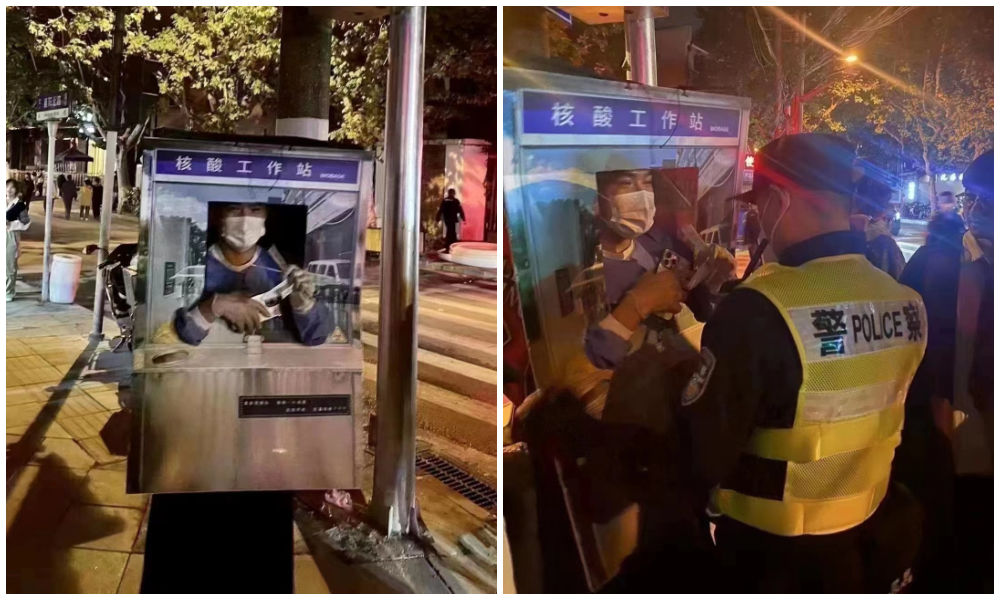
Halloween 2022: dressed up as nucliec acid booths. Via @manyapan twitter.
In December 2022, along with the announced changed rules in China’s ‘zero Covid’ approach, nucleic acid booths were suddenly left dismantled and empty.
With many cities spending millions to set up these booths in central locations, the question soon arose: what should they do with the abandoned booths?
This question also relates to who actually owns them, since the ownership is mixed. Some booths were purchased by authorities, others were bought by companies, and there are also local communities owning their own testing booths. Depending on the contracts and legal implications, not all booths are able to get a new function or be removed yet (Worker’s Daily).
In Tianjin, a total of 266 nucleic acid booths located in Jinghai District were listed for public acquisition earlier this month, and they were acquired for 4.78 million yuan (US$683.300) by a local food and beverage company which will transform the booths into convenience service points, selling snacks or providing other services.
Tianjin is not the only city where old nucleic acid testing booths are being repurposed. While some booths have been discarded, some companies and/or local governments – in cooperation with local communities – have demonstrated creativity by transforming the booths into new landmarks. Since the start of 2023, different cities and districts across China have already begun to repurpose testing booths. Here, we will explore ten different way in which China’s abandoned nucleic test booths get a second chance at a meaningful existence.
1: Pharmacy/Medical Booths
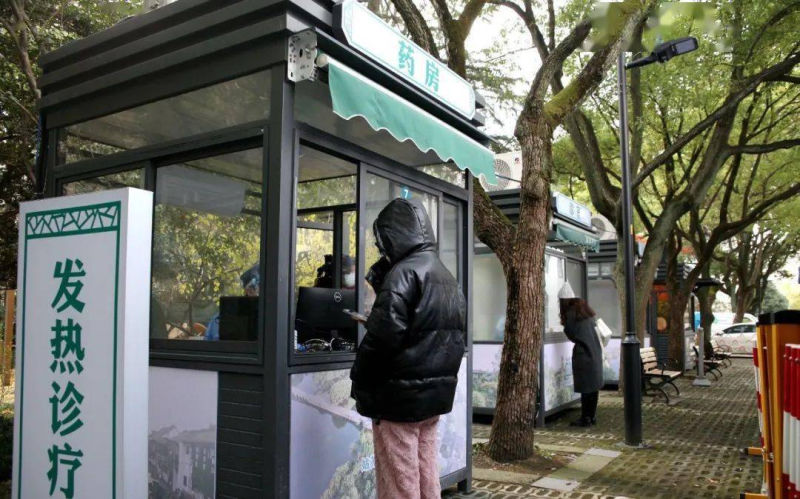
Via ‘copyquan’ republished on Sohu.
Blogger ‘copyquan’ recently explored various ways in which abandoned PCR testing points are being repurposed.
One way in which they are used is as small pharmacies or as medical service points for local residents (居民医疗点). Alleviating the strain on hospitals and pharmacies, this was one of the earliest ways in which the booths were repurposed back in December of 2022 and January of 2023.
Chongqing, Tianjin, and Suzhou were among earlier cities where some testing booths were transformed into convenient medical facilities.
2: Market Stalls
In Suzhou, Jiangsu province, the local government transformed vacant nucleic acid booths into market stalls for the Spring Festival in January 2022, offering them free of charge to businesses to sell local products, snacks, and traditional New Year goods.
The idea was not just meant as a way for small businesses to conveniently sell to local residents, it was also meant as a way to attract more shoppers and promote other businesses in the neighborhood.
3: Community Service Center

Small grid community center in Shizhuang Village, image via Sohu.
Some residential areas have transformed their local nucleic acid testing booths into community service centers, offering all kinds of convenient services to neighborhood residents.
These little station are called wǎnggé yìzhàn (网格驿站) or “grid service stations,” and they can serve as small community centers where residents can get various kinds of care and support.
4: “Refuel” Stations
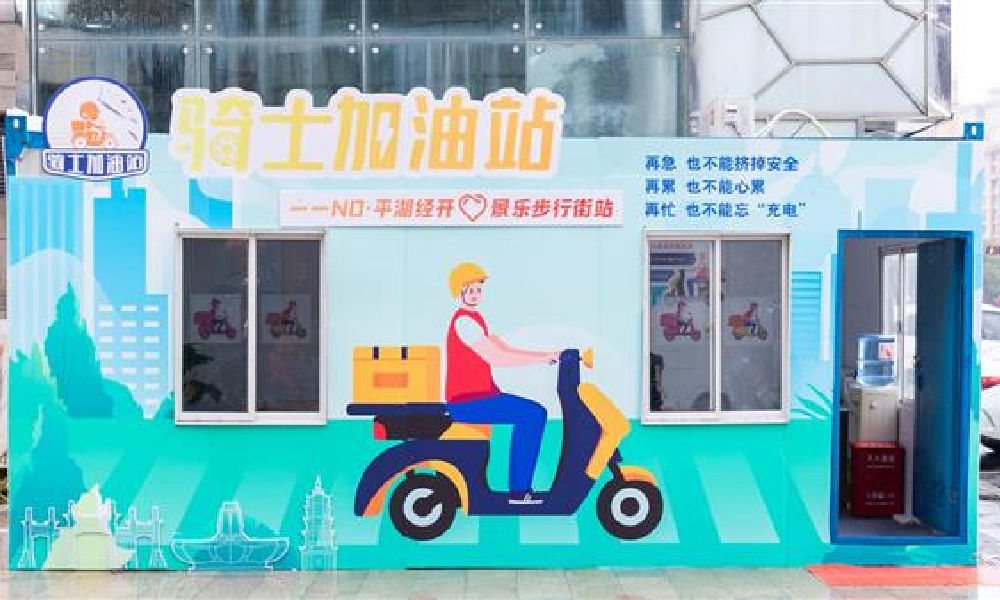
In February of this year, 100 idle nucleic acid sampling booths were transformed into so-called “Rider Refuel Stations” (骑士加油站) in Zhejiang’s Pinghu. Although it initially sounds like a place where delivery riders can fill up their fuel tanks, it is actually meant as a place where they themselves can recharge.
Delivery riders and other outdoor workers can come to the ‘refuel’ station to drink some water or tea, warm their hands, warm up some food and take a quick nap.
5: Free Libraries
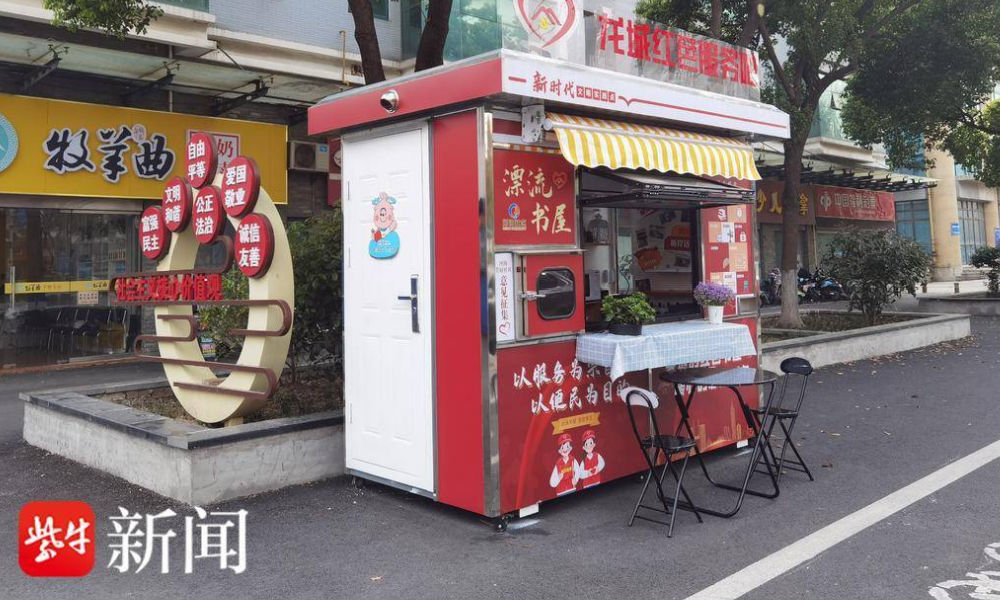
image via sohu.
In various Chinese cities, abandoned nucleic acid booths have been transformed into little free libraries where people can grab some books to read, donate or return other books, and sit down for some reading.
Changzhou is one of the places where you’ll find such “drifting bookstores” (漂流书屋) (see video), but similar initiatives have also been launched in other places, including Suzhou.
6: Study Space
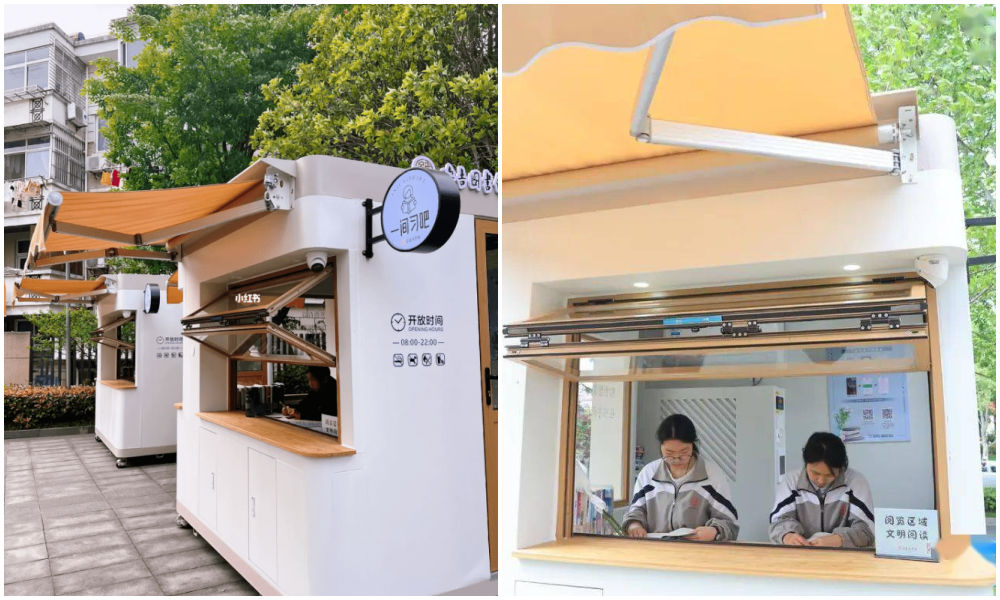
Photos via Copyquan’s article on Sohu.
Another innovative way in which old testing points are being repurposed is by turning them into places where students can sit together to study. The so-called “Let’s Study Space” (一间习吧), fully airconditioned, are opened from 8 in the morning until 22:00 at night.
Students – or any citizens who would like a nice place to study – can make online reservations with their ID cards and scan a QR code to enter the study rooms.
There are currently ten study booths in Anji, and the popular project is an initiative by the Anji County Library in Zhejiang (see video).
7: Beer Kiosk
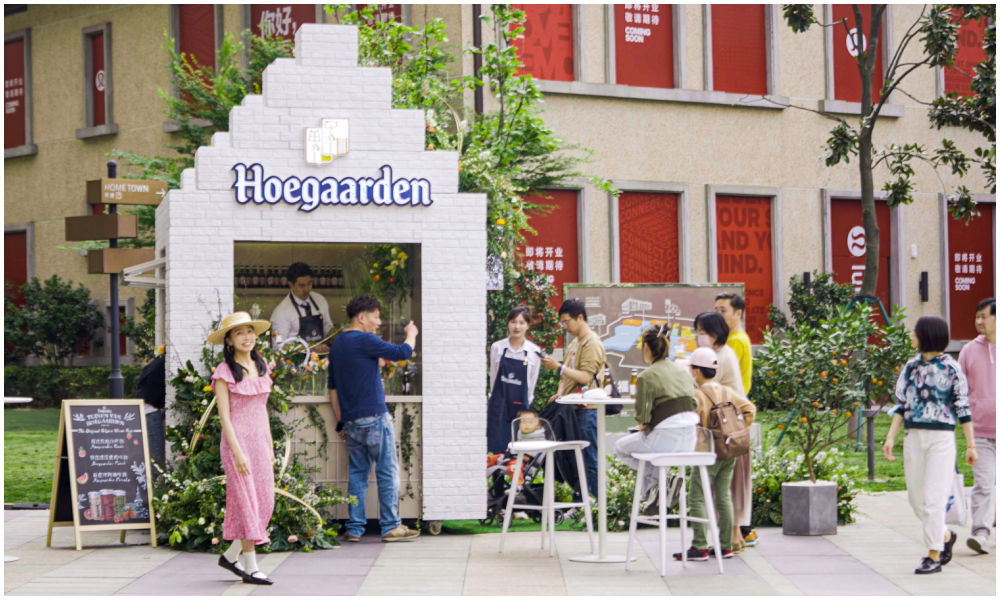
Hoegaarden beer shop, image via Creative Adquan.
Changing an old nucleic acid testing booth into a beer bar is a marketing initiative by the Shanghai McCann ad agency for the Belgium beer brand Hoegaarden.
The idea behind the bar is to celebrate a new spring after the pandemic. The ad agency has revamped a total of six formr nucleic acid booths into small Hoegaarden ‘beer gardens.’
8: Police Box

In Taizhou City, Jiangsu Province, authorities have repurposed old testing booths and transformed them into ‘police boxes’ (警务岗亭) to enhance security and improve the visibility of city police among the public.
Currently, a total of eight vacant nucleic acid booths have been renovated into modern police stations, serving as key points for police presence and interaction with the community.
9: Lottery Ticket Booths
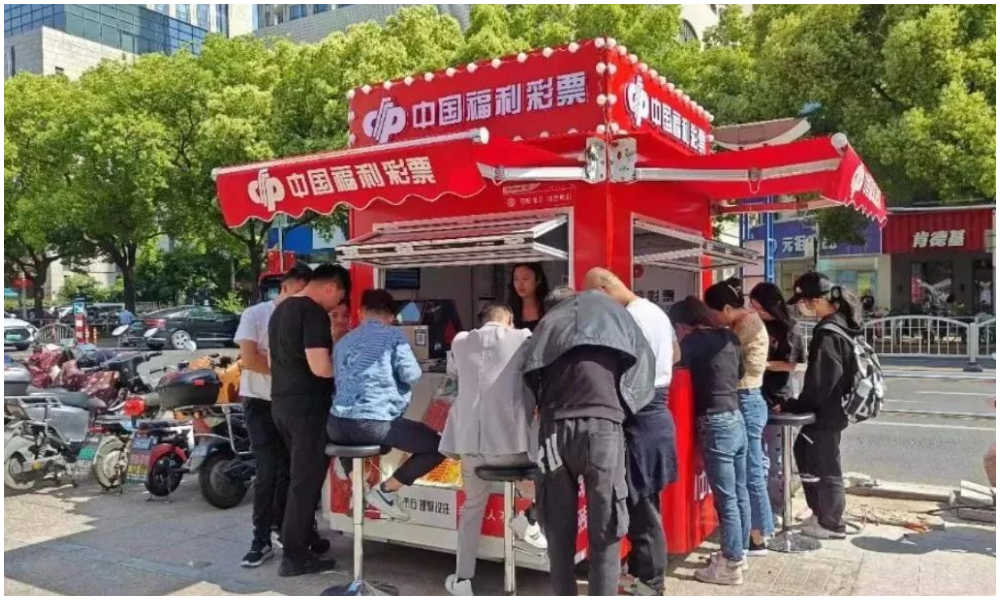
Image via The Paper
Some nucleic acid booths have now been turned into small shops selling lottery tickets for the China Welfare Lottery. One such place turning the kiosks into lottery shops is Songjiang in Shanghai.
Using the booths like this is a win-win situation: they are placed in central locations so it is more convenient for locals to get their lottery tickets, and on the other hand, the sales also help the community, as the profits are used for welfare projects, including care for the elderly.
10: Mini Fire Stations
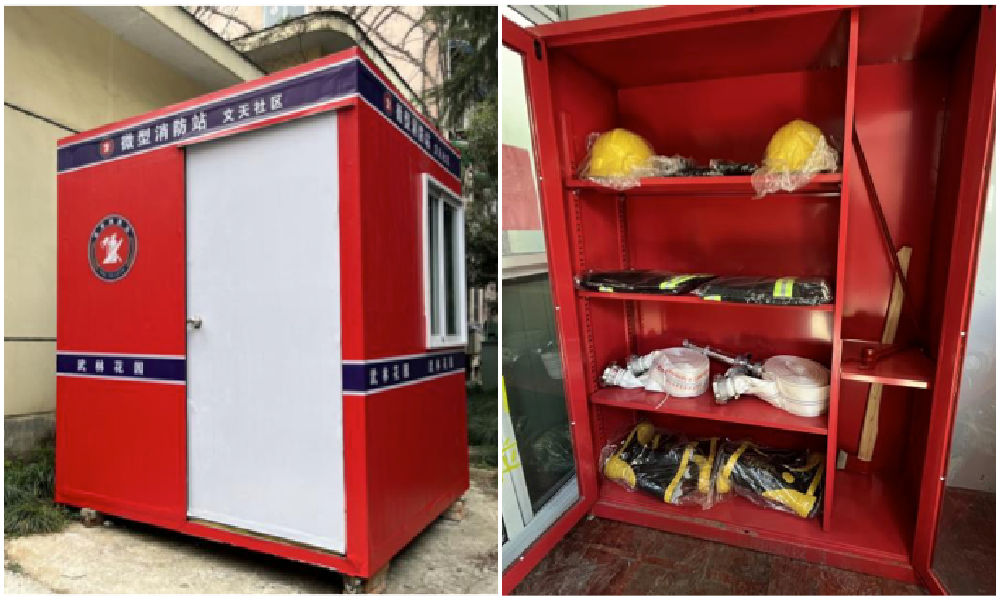
Micro fire stations, images via ZjNews.
Some communities decided that it would be useful to repurpose the testing points and turn them into mini fire kiosks, just allowing enough space for the necessary equipment to quickly respond to fire emergencies.
Want to read more about the end of ‘zero Covid’ in China? Check our other articles here.
By Manya Koetse,
Get the story behind the hashtag. Subscribe to What’s on Weibo here to receive our newsletter and get access to our latest articles:
Spotted a mistake or want to add something? Please let us know in comments below or email us. First-time commenters, please be patient – we will have to manually approve your comment before it appears.
©2023 Whatsonweibo. All rights reserved. Do not reproduce our content without permission – you can contact us at info@whatsonweibo.com.
Subscribe

Weibo Watch: The Future is Here

“Bye Bye Biden”: Biden’s Many Nicknames in Chinese

Enjoying the ‘Sea’ in Beijing’s Ditan Park

A Triumph for “Comrade Trump”: Chinese Social Media Reactions to Trump Rally Shooting

Weibo Watch: Get Up, Stand Up

The Tragic Story of “Fat Cat”: How a Chinese Gamer’s Suicide Went Viral

“Old Bull Eating Young Grass”: 86-Year-Old Chinese Painter Fan Zeng Marries 36-Year-Old Xu Meng

A Brew of Controversy: Lu Xun and LELECHA’s ‘Smoky’ Oolong Tea

Singing Competition or Patriotic Fight? Hunan TV’s ‘Singer 2024’ Stirs Nationalistic Sentiments

Zara Dress Goes Viral in China for Resemblance to Haidilao Apron

Weibo Watch: The Battle for the Bottom Bed

About the “AI Chatbot Based on Xi Jinping” Story

China’s Intensified Social Media Propaganda: “Taiwan Must Return to Motherland”

Weibo Watch: Telling China’s Stories Wrong

Saying Goodbye to “Uncle Wang”: Wang Wenbin Becomes Chinese Ambassador to Cambodia
Get in touch
Would you like to become a contributor, or do you have any tips or suggestions? Get in touch here!
Popular Reads
-

 China Insight3 months ago
China Insight3 months agoThe Tragic Story of “Fat Cat”: How a Chinese Gamer’s Suicide Went Viral
-

 China Music4 months ago
China Music4 months agoThe Chinese Viral TikTok Song Explained (No, It’s Not About Samsung)
-

 China Digital10 months ago
China Digital10 months agoToo Sexy for Weibo? Online Discussions on the Concept of ‘Cābiān’
-

 China Arts & Entertainment12 months ago
China Arts & Entertainment12 months agoBehind 8 Billion Streams: Who is Dao Lang Cursing in the Chinese Hit Song ‘Luocha Kingdom’?





